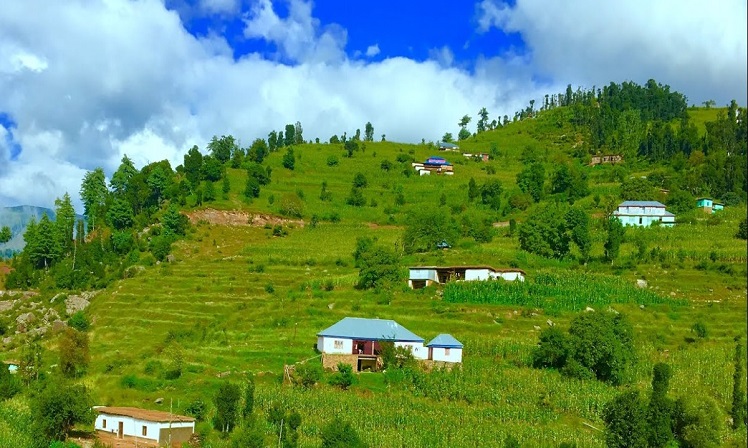
Pancheri is a small town situated on a hill similar to Patni Top or Natha Top surrounded by small peaks of Shivalik range. Last year, the government of Jammu and Kashmir declared it a tourist village and asked the locals to arrange homestays in the place of the tourists visiting there and also take care of their (local) financial incentives. This gave them the opportunity to be independent and generated sources of income that opened the gates of the hotel and restaurant industry; although it is still in its infancy.
The road beyond Jammu leads to the four-lane Highway No. 44 to Udhampur, where you have to turn up to a military area called Supply Morh. Only seven kilometers of internal roads and one passes past the archaeologically famous Pandav temples of Krimchi. From there it is a steady twenty-plus kilometer climb to the highest point of the mountain, Kainth Gal, where the road to Moungari splits. So far the road ride is very nice even though it is a single but Pacca tarred road. Four kilometers plus place from Kainth Gal and onwards makes you doubt your decision to come to Pancheri. The road is completely covered with rocks and stones scattered here and there. There are clear signs of landslides in this place. You can't drive more than ten or twenty times an hour, which is enough to crush you when you drive your car! With great work and effort we crossed this terrible place to finally reach the promised land. But the effort was worth it. Reaching my goal reminded me of the title of Thomas Hardy's famous Far from the Madding Crowd.
The best place in this area, without which a Pancher call cannot be complete, is the dense forest area of this place. Locally known as Dayar Jungle, the forest is full of Devdar trees which are widely spread. As soon as one enters the jungles of Dayar, one is literally transformed into another world; the world that ruled in our state more than fifty years ago. Everywhere one looks, one finds rows of tall, upright Himalayan cedars or devdar trees, their branches swaying in gentle rhythmic movements as if to warmly welcome guests. The sound of the wind feels like a stream flowing nearby. It is a scientifically proven fact that the wood, resin and bark of Deodar trees are known for their anti-inflammatory, antioxidant and anti-cancer properties. Its wood was also used to treat fever, insomnia, lung and urinary tract diseases. But the common man sitting on the lush green grass in the Dayar jungle can really feel the air filled with the fragrance of these trees after breathing. It gives him a feeling of freshness, calmness and rejuvenation.
Our Pancher travelogue will surely be incomplete if we don't talk about the home place. Although a good number of such homestays started when Pancheri was declared a tourist village, even today there are about a dozen Plussa homestays that can easily cater to the needs of the influx of tourists. The homestay where we stayed was a stone's throw away from the Dayar Jungle. Although we have had good experience with homestays at various places in Himachal Pradesh; it was unique. The owner Sham Ji bought some rooms with all modern amenities and traditional accommodations. He himself took care of the dietary needs of all the guests. The joy of the stay was the presence of a chulla with firewood and food cooked on it, reminiscent of childhood memories. We were also served makki ki roti made by chullah women. While Pancheri wants to welcome tourists, there are some gray areas that require immediate attention from the authorities. The first glimpse is a frustrating, bumpy ride on the dirt and debris-laden road between Kainth Gal and Sankri Devta. The tourist seems to regret why he drew Pancheri. After macadamia, this patch will surely attract many tourists. Another difficulty that outsiders face is that there are hardly any eateries in the area, not even a few dhabas. Now that this area is gaining fame, local people should be encouraged to open eateries, small restaurants or dhabas to cater to the needs of not only the locals but also the day picnickers. Nowadays, tourists in all regions demand fast food and snacks and other food besides the main meals, which are currently not available in this hill station. The government has also constructed six one BHK tree houses which are not yet available for public use. Without proper use, these cabins are at risk of the wrath of the weather and neglect. Their introduction not only brings revenue to the government but also provides good accommodation to tourists who would otherwise not prefer homestays.
Leave a comment: (Your email will not be published)